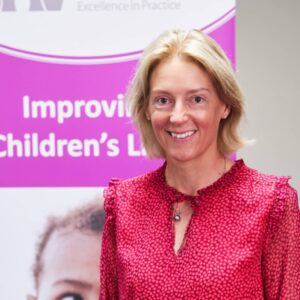4th October 2024
Genomics is set to transform the future of healthcare. In this Voices blog, Sally Shillaker, iHV Practice Development Lead for Genomics, provides a helpful update on the Generation Study which is being delivered across numerous sites in England – this will have implications for families and health visiting practice that all practitioners will need to be aware of.
“Every year hundreds of babies are born in the UK with rare genetic conditions. Early interventions can enhance the health and quality of life of many of these babies. But conditions can be hard to diagnose, leading to delays in care.” Newborn Genomes Programme | Genomics England
The Generation Study is a large quantitative, longitudinal birth cohort study open at multiple NHS sites in England. It is being run by Genomics England in partnership with the NHS and has been approved by the Health Research Authority (IRAS number: 324562).
The main question the Generation Study wishes to answer is: “what are the benefits and challenges of genome sequencing in newborn babies?”
To answer this, it will offer whole genome sequencing to 100,000 babies across England to test for changes in their genes known to cause 200+ rare genetic conditions, with the aim of finding these conditions early and offering suitable health care.
The 200+ conditions have been carefully chosen. They usually appear in the first few years of life; care can be improved if found early and can be treated by the NHS in England.
There are three aims to the Generation Study:
- Identify rare conditions in babies earlier
- Enable research about genes and health
- Explore the risks and benefits of storing an individual’s genome over their lifetime
What does participation mean for babies and families?
- If the baby’s mother/birthing parent is eligible, and their hospital is a site delivering the Generation Study, they will be invited to consider becoming a participant during their pregnancy.
- If they choose to participate, they will give consent during pregnancy and a blood sample from their baby will be taken shortly after birth. From this blood sample, the baby’s DNA will be extracted, genome sequenced, analysed, and stored.
- Following analysis, all babies will receive a result.
- There are two test results: no conditions suspected, and condition suspected. Most babies – estimated 99% – will receive a no conditions suspected They will be contacted by letter or email a few months after birth. A small number of babies – estimated 1% – will receive a condition suspected result. They will be contacted by an NHS specialist as soon as possible who will explain the result and arrange follow up tests to confirm whether the baby has the condition or not.
- There is a small possibility that a sample cannot be sequenced due to several reasons and if this occurs, participants will be informed by letter or email, and they will not be provided with results.
- Participants will be contacted from time-to-time with updates about the Generation Study.
- The mother/birthing parent is free to withdraw their baby/child from the study at any time.
What does the Generation Study mean for universal NHS care?
- The Generation Study does not replace any current NHS care such as the Newborn Blood Spot (NBS) screening test. This is highlighted to parents, and they are encouraged to have the NBS test completed for their baby on day five as part of usual care. Results for the NBS are separate from the Generation Study results and likely to be received sooner.
- For babies who receive a no condition suspected result, this means they are unlikely to develop one of the conditions the Generation Study has screened for, however, this result does not mean the baby will never get sick, since there are many other health conditions they could get.
- Parents may wish to ask questions about their baby’s test result and seek support from their health visitor.
How can health visitors support the Generation Study?
- Understand the important distinctions between current NHS care and the Generation Study – encouraging participants to receive all NHS care, such as Newborn Blood Spot Screening and offering clarification where appropriate about the importance of current NHS care.
- The Generation Study will not detect all conditions included in current NBS screening, notably Congenital hypothyroidism (CHT).
- The Generation Study will not detect all forms of the conditions identified by current screening.
- The Generation Study may not allow the timely early treatment needed by some babies, notably those with Maple Syrup Urine Disease (MSUD), Isovaleric Acidaemia (IVA) and Medium-Chain Acyl-CoA Dehydrogenase Deficiency (MCADD). These metabolic conditions can be life threatening if not recognised quickly or treated appropriately.
- Understand the Generation Study design especially the process of receiving results and the health visitor’s potential role here. In particular, health visitors can play an important role in supporting families who receive a condition suspected result where care should be in line with the Healthy Child Programme and local pathways for children with SEND. Families’ needs will vary, depending on their individual circumstances and the condition detected. There is strong evidence that the time around diagnosis can be a period of heightened anxiety for families with children with SEND, and having access to good early support and appropriate interventions/treatment can make a big difference.
- Contact your participating hospital to familiarise yourself with the local set up for the Generation Study. You can check if your local hospital is a participating site on the Generation Study website Generation Study – Generation Study
- Genomics England is committed to promoting diverse participation in the Generation Study to ensure all eligible participants have the choice to participate. The following languages have a translated version of the Patient Information leaflet, Arabic, Bengali, French, Hindi, Italian, Polish, Punjabi, Romanian, Spanish and Urdu.



